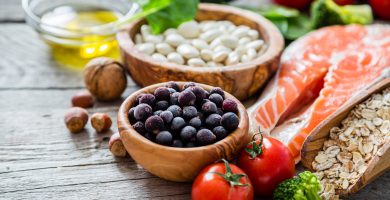5 key factors to consider when looking at nutrition and arthritis.
(1) Maintain a healthy body weight
Excessive body weight puts extra stress on the joints, exacerbating arthritis.
Adipose (fat) tissue releases hormones and chemicals into the body, some of which promote inflammation, which in turn can contribute to joint damage.
(2) Increase foods rich in omega-3 fats
Omega-3 fats can reduce inflammation and be protective of joint tissue by suppressing the producing of enzymes that break down cartilage.
Good sources of omega-3 fats are oily fish such as wild salmon, mackerel, herring, sardines, rainbow trout, flaxseeds, chia seeds and walnuts.
(3) Eat plenty of vegetables and fruits – fill half of your plate with a variety of differently-coloured vegetables.
These are packed with nutrients that support joint health.
Bell peppers, strawberries, citrus fruits and kiwi fruit are good sources of vitamin C which is vital for cartilage development.
Carrots, butternut and other squashes, tomatoes, asparagus, sweet potatoes, Brussels sprouts, chard, lettuce, spinach and other greens contain beta-carotene which is a powerful antioxidant that helps to reduce inflammation.
(4) Reduce saturated fats as these can promote inflammation.
Foods containing high levels of saturated fats include butter, cream, ghee, full-fat milk, cheese, red meat (e.g. beef, pork, lamb), processed meats such as salami, sausages, cakes and pastries.
(5) Reduce sugary foods and highly refined carbohydrates such as white bread, white pasta and white rice as these can promote inflammation. Eat wholegrain bread and pasta and brown or wild rice instead.
Nuts and seeds can make a healthier alternative snack to crisps or chocolate.




